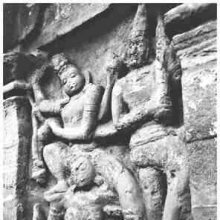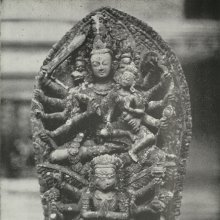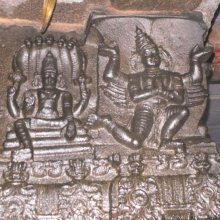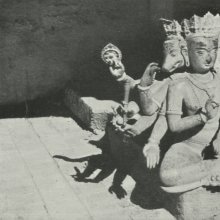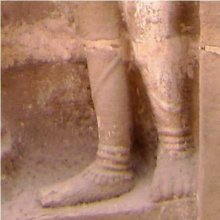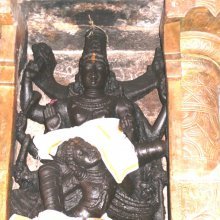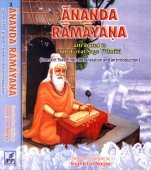Vaikuntha, Vaikuṇṭha, Vaikuṃṭha, Vaikuṇṭhā, Vaikumtha, Vaikumthapati: 29 definitions
Introduction:
Vaikuntha means something in Hinduism, Sanskrit, Marathi, Jainism, Prakrit, Hindi, biology. If you want to know the exact meaning, history, etymology or English translation of this term then check out the descriptions on this page. Add your comment or reference to a book if you want to contribute to this summary article.
Alternative spellings of this word include Vaikunth.
Images (photo gallery)
(+1 more images available)
In Hinduism
Purana and Itihasa (epic history)
Source: archive.org: The Garuda puranamA Vaikuntha stone is of the hue of a jem on the hood of a serpent, of dark colour and bears one circular mark.
Source: archive.org: Puranic Encyclopedia1) Vaikuṇṭha (वैकुण्ठ).—The dwelling place of Mahāviṣṇu.
2) Vaikuṇṭha (वैकुण्ठ).—Another name of Mahāviṣṇu. It is mentioned in Mahābhārata, Śānti Parva, Chapter 342, Stanza 80, that when Viṣṇu made creation with the five elements, his powers did not have any hindrance (Kuṇṭhita) and so he got the name Vaikuṇṭha.
3) Vaikuṇṭha (वैकुण्ठ).—A Brahmin saint who lived in the Tretāyuga. The living things got deliverance from sin, the moment they came into contact with him. This power of Vaikuṇṭha to give living things deliverance, is mentioned in Padma Purāṇa, Brahma khaṇḍa, Chapter 3, as follows:
Vaikuṇṭha once lighted a ghee-lamp in the presence of Viṣṇu in Kārttika and returned home. At that time a rat came there and began to drink the ghee. Then the lamp blazed into a flame. The rat was terrified at this, and ran away. But by the grace of Viṣṇu the rat got deliverance from all its sins.
That rat was killed by snake-bite. The men of Yama came with ropes. Instantly the messengers of Viṣṇu also came on Garuḍa. Yama’s men got afraid of Viṣṇu’s messengers and humbly aksed them: "For what goodness of him are you taking this great sinner to Vaikuṇṭha?" They replied: "He had blazed a lamp before the presence of Viṣṇu. That act has earned for him a place in Vaikuṇṭha. The goodness earned by lighting a lamp with devotion and love in Kārttika, could be described only by Mukunda." After that the rat was taken to Vaikuṇṭha.
Source: archive.org: Shiva Purana - English TranslationVaikuṇṭha (वैकुण्ठ) or Vaikuṇṭhanagara refers to the permanent above of Viṣṇu, according to the Śivapurāṇa 2.1.15:—“[...] after getting the blessings of Śiva and going out of the cosmic egg (brahmāṇḍa), Viṣṇu made Vaikuṇṭha his permanent abode [viz., vaikuṇṭha-nagara]. [...] O celestial sage, Kailāsa and Vaikuṇṭha will never be destroyed even if the whole cosmic egg is destroyed”.
Note: Vaikuṇṭha (also called Vaibhra) is Viṣṇu’s abode variously described as situated in the Northern ocean or on the eastern peak of mount Meru.
Source: Cologne Digital Sanskrit Dictionaries: The Purana Index1a) Vaikuṇṭha (वैकुण्ठ).—A name of Hari.*
- * Bhāgavata-purāṇa I. 15. 46.
1b) The abode of Viṣṇu, established by Him at the request of Śrī in his manifestation as Vaikuṇṭha: Famous for Naiśreyasa vana, filled with different trees and birds. It had seven enclosures into which sin had no free entrance. On the seventh were stationed two guardian deities. These once prevented Lakṣmī from entering in during the yoganidrā of Hari;1 happiness (saubhāgya) of beings retired to, during the burning of the worlds.2
1c) A manifestation of Hari born of Vaikuṇṭhā and Śubhra in Cākṣuṣa epoch. At the request of his spouse Śrī, Vaikuṇṭha (Heaven) came into existence in the Vaivasvata epoch, to the right of Śivaloka.*
- * Bhāgavata-purāṇa VIII. 5. 4-6; Brahmāṇḍa-purāṇa III. 3. 117; 32. 3; IV. 29. 136; 40. 9; Viṣṇu-purāṇa III. 1. 41; V. 5. 21.
1d) The 22nd kalpa.*
- * Matsya-purāṇa 290. 8.
1e) In the Cyavana āśrama of Gayā;1 the abode of Viṣṇu.2
1f) A class of gods,1 Jayādevas, fourteen in number in the epochs of Raivata Manu and Svāyambhuva.2
- 1) Bhāgavata-purāṇa VIII. 5. 4; Viṣṇu-purāṇa III. 1. 21.
- 2) Brahmāṇḍa-purāṇa II. 36. 51 and 58; III. 3. 9, 58 and 67; 4. 31; Vāyu-purāṇa 66. 9; 67. 40-41.
2) Vaikuṇṭhā (वैकुण्ठा).—The mother of Vaikuṇṭha devas.*
- * Vāyu-purāṇa 67. 40.
Vaikuṇṭha (वैकुण्ठ) is a name mentioned in the Mahābhārata (cf. VI.9.15) and represents one of the many proper names used for people and places. Note: The Mahābhārata (mentioning Vaikuṇṭha) is a Sanskrit epic poem consisting of 100,000 ślokas (metrical verses) and is over 2000 years old.
Source: Shodhganga: The saurapurana - a critical studyVaikuṇṭha (वैकुण्ठ) refers to a group of deities in the Raivatamanvantara: one of the fourteen Manvantaras, according to the 10th century Saurapurāṇa: one of the various Upapurāṇas depicting Śaivism.—Accordingly, “In raivatamanvantara the name of Indra was Vibhu. The gods were divided into four groups like Vaikuṇṭha etc. The Saptarṣis were said to be Hiraṇyaromā, Viśvaśrī, Aindrabāhu, Urdhavabāhu, Subāhu, Parjanya and Mahāmuni who were born in the race of Priyavrata.

The Purana (पुराण, purāṇas) refers to Sanskrit literature preserving ancient India’s vast cultural history, including historical legends, religious ceremonies, various arts and sciences. The eighteen mahapuranas total over 400,000 shlokas (metrical couplets) and date to at least several centuries BCE.
Shaktism (Shakta philosophy)
Source: Wisdom Library: Śrīmad Devī BhāgavatamThen the Bhagavān Viṣṇu built the Vaikuṇṭha city on the top of all the lokas or worlds to dwell with his consort Lakṣmī. Mahādeva, too, built the exceedingly beautiful Kailāśa and stayed there with his Bhūtas and played with them at his will. See the Devī-bhāgavata-purāṇa (chapter on the Devī-yajña).

Shakta (शाक्त, śākta) or Shaktism (śāktism) represents a tradition of Hinduism where the Goddess (Devi) is revered and worshipped. Shakta literature includes a range of scriptures, including various Agamas and Tantras, although its roots may be traced back to the Vedas.
Kavya (poetry)
Source: Shodhganga: The Kavyamimamsa of RajasekharaVaikuṇṭha (वैकुण्ठ) is the name of an important person (viz., an Ācārya or Kavi) mentioned in Rājaśekhara’s 10th-century Kāvyamīmāṃsā.—It is another name of Lord Viṣnu. Who is one of the sixty-four disciples of Śrikaṇṭha.

Kavya (काव्य, kavya) refers to Sanskrit poetry, a popular ancient Indian tradition of literature. There have been many Sanskrit poets over the ages, hailing from ancient India and beyond. This topic includes mahakavya, or ‘epic poetry’ and natya, or ‘dramatic poetry’.
Vaishnavism (Vaishava dharma)
Source: Acta Orientalia vol. 74 (2013): Historical sequence of the Vaiṣṇava DivyadeśasVaikuṇṭha (Vaikuntam) or Paramapadam refers to one of the 108 Vaishnava Divya Desam (divyadeśas or divyasthalas), located in the topographical division of heaven, according to the 9th century Nālāyirativviyappirapantam (shortly Nālāyiram).—Tradition would record the Vaiṣṇava divyadeśas or divyasthalas are 108. The divyadeśa is a base of the cult of Viṣṇu in Viṣṇuism [Vaiṣṇavism] tradition. The list of 108 [viz., Vaikuṇṭha] seems to have reached maturation by about the early 9th century CE as all the deśas are extolled in the hymns of the twelve Āḻvārs.
Source: Pure Bhakti: Brhad BhagavatamrtamVaikuṇṭha (वैकुण्ठ) refers to:—Literally, ‘a place with no anxiety.’ This is the majestic realm of the spiritual world that is the kingdom of Śrī Nārāyaṇa and His various expansions. All the residents of Vaikuṇṭha have eternal, spiritual bodies. They possess four arms and a darkish complexion like that of Śrī Bhagavān and are fully engaged in His service in pure love and devotion. This devotion is imbued with the mood of awe and reverence, and therefore, the sense of intimacy with the Lord is somewhat restricted there. (cf. Glossary page from Śrī Bṛhad-bhāgavatāmṛta).

Vaishnava (वैष्णव, vaiṣṇava) or vaishnavism (vaiṣṇavism) represents a tradition of Hinduism worshipping Vishnu as the supreme Lord. Similar to the Shaktism and Shaivism traditions, Vaishnavism also developed as an individual movement, famous for its exposition of the dashavatara (‘ten avatars of Vishnu’).
Ayurveda (science of life)
Toxicology (Study and Treatment of poison)
Source: Shodhganga: Kasyapa Samhita—Text on Visha ChikitsaVaikuṇṭha (वैकुण्ठ) (or Tulasi) refers to an herbal ingredient which is included in a (snake) poison antidote recipe , according to the Kāśyapa Saṃhitā: an ancient Sanskrit text from the Pāñcarātra tradition dealing with both Tantra and Viṣacikitsā—an important topic from Āyurveda which deals with the study of Toxicology (Viṣavidyā or Sarpavidyā).—Kāśyapa prescribes various antidotes to quell the poison by administering them through nasal drugs, collyrium, ointment, herbal drinks and diet. According to Kāśyapasaṃhitā (verse VIII.19)—“Another nasal application for neutralising the poison is equal quantities of Nirguṇḍī, Agni, Vaikuṇṭha or Tulasi, Vyoṣa, Vacā and Asafoetida made into a paste with the juice of Bāhāvallī or bittergourd applied near the heart and region and neck and also administered nasally also beget positive results in combating poison”.

Āyurveda (आयुर्वेद, ayurveda) is a branch of Indian science dealing with medicine, herbalism, taxology, anatomy, surgery, alchemy and related topics. Traditional practice of Āyurveda in ancient India dates back to at least the first millenium BC. Literature is commonly written in Sanskrit using various poetic metres.
General definition (in Hinduism)
Source: Wisdom Library: HinduismVaikuṇṭha (वैकुण्ठ)—One of the several gaṭhas (bathing places) in the twelve forests on the banks of the Yamunā.
Source: WikiPedia: HinduismVishnuloka is the home of the Supreme Lord Vishnu. It is the eternal abode of Narayana or Vishnu or Hari, his consort Lakshmi, and Shesha, upon whom they rest. In most of the extant Puranas, and Vaishnava traditions, Vaikuntham (Vishnuloka) is located in the direction of the Makara Rashi (Shravana Zodiac) which coincides with the Capricorn constellation. Vishnu's eye is supposed to be located at the South Celestial Pole as well.
Vaikuntha is known as Paramdhama where liberated souls dwell for eternity enjoying pure bliss and happiness in the company of God Narayana or Vishnu. Vaikuntha is beyond the periphery of the material universe and hence, cannot be perceived or measured by material science and logic.
etymology: Vaikuntha (Sanskrit वैकुंठ, vaikuṃṭha), Vaikuntha-loka, Brahmaloka-sanatana or Abode of Brahman, Brahmajyoti, Param Padam (‘supreme abode’), or Paramapadam.
Source: Jiva Institute: HinduismJīva Gosvāmī explains that Vaikuṇṭha cannot be attained by dualistic action, or in other words, by result-oriented action of any kind. This is to say that it cannot be attained by any method other than nondual devotion, which is not a method in the sense of generating any extraneous effect. It is immediate and direct centering of awareness in the nondual complete whole, facilitated through the agency of His own internal potency.
Vaikuṇṭha is attained by nondual devotion. Although nondual devotion makes use of the mind and physical senses, which is to say that it manifests through these agencies, it is not mental or physical action. This means that it is not dualistic action performed by an apparent isolated doer, through instruments (the mind and senses) that are distinct from the doer, and generating an effect that is again distinct from both the doer and its instruments. Nondual devotion, rather, is directly the potency of the nondual Absolute.
Biology (plants and animals)
Source: Google Books: CRC World Dictionary (Regional names)Vaikuntha in India is the name of a plant defined with Anisomeles malabarica in various botanical sources. This page contains potential references in Ayurveda, modern medicine, and other folk traditions or local practices It has the synonym Craniotome mauritianum (Pers.) Bojer (among others).
Example references for further research on medicinal uses or toxicity (see latin names for full list):
· Taxon (1982)
· Journal of Cytology and Genetics (1982)
· Curtis’s Botanical Magazine (2071)
· International Journal of Cancer Research (2007)
· Glimpses in Plant Research (1998)
· Proceedings of the Indian Science Congress Association (1979)
If you are looking for specific details regarding Vaikuntha, for example health benefits, pregnancy safety, extract dosage, side effects, chemical composition, diet and recipes, have a look at these references.

This sections includes definitions from the five kingdoms of living things: Animals, Plants, Fungi, Protists and Monera. It will include both the official binomial nomenclature (scientific names usually in Latin) as well as regional spellings and variants.
Languages of India and abroad
Marathi-English dictionary
Source: DDSA: The Molesworth Marathi and English Dictionaryvaikuṇṭha (वैकुंठ).—n m (S) The paradise of Visn̤u. It is stated by some to be in the Northern Ocean, by others, on the eastern peak of Mount Meru.
Source: DDSA: The Aryabhusan school dictionary, Marathi-Englishvaikuṇṭha (वैकुंठ).—n m The paradise of Vishnu.
Marathi is an Indo-European language having over 70 million native speakers people in (predominantly) Maharashtra India. Marathi, like many other Indo-Aryan languages, evolved from early forms of Prakrit, which itself is a subset of Sanskrit, one of the most ancient languages of the world.
Sanskrit dictionary
Source: DDSA: The practical Sanskrit-English dictionaryVaikuṇṭha (वैकुण्ठ).—a. Unassailable (durdharṣa); इन्द्रो वैकुण्ठोऽपराजिता सेनेति वा अहमेतमुपास (indro vaikuṇṭho'parājitā seneti vā ahametamupāsa) Bṛ. Up.2.1.6.
--- OR ---
Vaikuṇṭha (वैकुण्ठ).—1 An epithet of Viṣṇu; मन्दं जहास वैकुण्ठो मोहयन्निव मायया (mandaṃ jahāsa vaikuṇṭho mohayanniva māyayā) Bhāgavata 1.8.44.
2) Of Indra.
3) Holy basil.
-ṇṭham 1 The heaven of Viṣṇu; ततो वैकुण्ठमगमद्भास्वरं तमसः परम् (tato vaikuṇṭhamagamadbhāsvaraṃ tamasaḥ param) Bhāgavata 1.88.25.
2) Talc.
Derivable forms: vaikuṇṭhaḥ (वैकुण्ठः).
Source: Cologne Digital Sanskrit Dictionaries: Shabda-Sagara Sanskrit-English DictionaryVaikuṇṭha (वैकुण्ठ).—m.
(-ṇṭhaḥ) 1. A name of Vishnu. 2. Indra. n.
(-ṇṭhaṃ) 1. The paradise or world of Vaikunt'ha or Vishnu; its site is variously described, either as in the northern ocean, or on the eastern peak of mount Meru. 2. Talc. E. vikuṇṭhā the wife of Subhra, and mother of Vishnu, in one form, aṇ patronymic aff.: other etymologies occur, as vi privative, &c. and kuṇṭha said to mean destruction, he who is indestructible; or vi before the same, explained knowledge or abode, being omniscient or omnipresent, &c.; again vi various, and kuṇṭha illusion, aff. aṇ .
Source: Cologne Digital Sanskrit Dictionaries: Benfey Sanskrit-English DictionaryVaikuṇṭha (वैकुण्ठ).— (partly properly patronym. from vikuṇṭhā, The mother of Viṣṇu, + a), I. m. 1. Viṣṇu, [Padma-Purāṇa, (ed. Wollheim.)] 2, 5. 2. Indra. Ii. n. 1. The paradise of Viṣṇu, [Pañcatantra] 48, 3. 2. Talc.
Source: Cologne Digital Sanskrit Dictionaries: Cappeller Sanskrit-English DictionaryVaikuṇṭha (वैकुण्ठ).—[masculine] [Epithet] of Indra or Viṣṇu; [masculine] [neuter] Viṣṇu’s heaven.
Source: Cologne Digital Sanskrit Dictionaries: Aufrecht Catalogus Catalogorum1) Vaikuṇṭha (वैकुण्ठ) as mentioned in Aufrecht’s Catalogus Catalogorum:—guru of Kavirāja Bhikṣu (Sāṃkhyatattvapradīpa etc.). Hall. p. 7.
2) Vaikuṇṭha (वैकुण्ठ):—father of Jayarāma, Rāma and Harirāma, grandfather of Raghurāma (Kālanirṇayasiddhānta). Io. 2044. 2045.
3) Vaikuṇṭha (वैकुण्ठ):—guru of Kavirāja Bhikṣu (Sāṃkhyatattvapradīpa etc.). In L. 4068 he is called Vaikuṇṭhānandatīrtha.
4) Vaikuṇṭha (वैकुण्ठ):—composed in 1688: Cāturmāsyayajñapaddhati Subodhinī.
5) Vaikuṇṭha (वैकुण्ठ):—Padmapuṣāñjalistotraṭīkā.
Source: Cologne Digital Sanskrit Dictionaries: Monier-Williams Sanskrit-English Dictionary1) Vaikuṇṭha (वैकुण्ठ):—m. ([from] vi-kuṇṭha) Name of Indra, [Śatapatha-brāhmaṇa; Kauṣītaki-upaniṣad]
2) of Viṣṇu (Kṛṣṇa), [Mahābhārata; Harivaṃśa] etc.
3) a statue of Viṣṇu, [Rājataraṅgiṇī]
4) the 24th day in the month of Brahmā, [cf. Lexicographers, esp. such as amarasiṃha, halāyudha, hemacandra, etc.]
5) (in music) a kind of measure, [Saṃgīta-sārasaṃgraha]
6) a kind of Ocimum, [cf. Lexicographers, esp. such as amarasiṃha, halāyudha, hemacandra, etc.]
7) Name of various men ([especially] authors and teachers), [Catalogue(s)]
8) (with Indra) Name of the supposed author of [Ṛg-veda x, 48-50; Anukramaṇikā]
9) [plural] or sg. ([scilicet] gaṇa) Name of a class of gods, [Purāṇa]
10) mn. Viṣṇu’s heaven (variously described as situated in the northern ocean or on the eastern peak of mount Meru), [Pañcatantra; Bhāgavata-purāṇa] etc.
11) n. talc, [Horace H. Wilson]
12) Vaikuṇṭhā (वैकुण्ठा):—[from vaikuṇṭha] f. Vaikuṇṭha’s (Viṣṇu’s) Śakti, [Pañcarātra]
Source: Cologne Digital Sanskrit Dictionaries: Yates Sanskrit-English DictionaryVaikuṇṭha (वैकुण्ठ):—(ṇṭhaḥ) 1. m. A name of Vishnu; Indra. n. Paradise of Vishnu; talc.
Source: DDSA: Paia-sadda-mahannavo; a comprehensive Prakrit Hindi dictionary (S)Vaikuṇṭha (वैकुण्ठ) in the Sanskrit language is related to the Prakrit words: Vaikuṃṭha, Vekuṃṭha.
[Sanskrit to German]
Sanskrit, also spelled संस्कृतम् (saṃskṛtam), is an ancient language of India commonly seen as the grandmother of the Indo-European language family (even English!). Closely allied with Prakrit and Pali, Sanskrit is more exhaustive in both grammar and terms and has the most extensive collection of literature in the world, greatly surpassing its sister-languages Greek and Latin.
Hindi dictionary
Source: DDSA: A practical Hindi-English dictionaryVaikuṃṭha (वैकुंठ) [Also spelled vaikunth]:—(nm) the heaven, paradise; ~[purī/loka] the city of Lord Vishnu—heaven; [vaikuṃṭhīya] pertaining to [vaikuṃṭha].
...
Prakrit-English dictionary
Source: DDSA: Paia-sadda-mahannavo; a comprehensive Prakrit Hindi dictionaryVaikuṃṭha (वैकुंठ) in the Prakrit language is related to the Sanskrit word: Vaikuṇṭha.
Prakrit is an ancient language closely associated with both Pali and Sanskrit. Jain literature is often composed in this language or sub-dialects, such as the Agamas and their commentaries which are written in Ardhamagadhi and Maharashtri Prakrit. The earliest extant texts can be dated to as early as the 4th century BCE although core portions might be older.
Kannada-English dictionary
Source: Alar: Kannada-English corpusVaikuṃṭha (ವೈಕುಂಠ):—
1) [noun] Viṣṇu.
2) [noun] the abode of Viṣṇu.
3) [noun] Indra, the lord of gods.
4) [noun] (pros.) the symbol for a short syllable.
5) [noun] ವೈಕುಂಠ ಸೇರು [vaikumtha seru] vaikuṇṭha sēru = ವೈಕುಂಠವಾಸಿಯಾಗು [vaikumthavasiyagu].
--- OR ---
Vaikuṃṭhapati (ವೈಕುಂಠಪತಿ):—[noun] Viṣṇu, the lord of ವೈಕುಂಠ [vaikumtha].
Kannada is a Dravidian language (as opposed to the Indo-European language family) mainly spoken in the southwestern region of India.
See also (Relevant definitions)
Starts with (+19): Vaikumthapada, Vaikumthasamaradhane, Vaikumthayatre, Vaikuntam, Vaikuntan, Vaikuntanatan, Vaikuntha Ekadashi, Vaikuntha-perumal, Vaikunthabhavana, Vaikunthabhuvana, Vaikunthacaturdashi, Vaikunthachaturdashi, Vaikunthadhama, Vaikunthadikshita, Vaikunthadikshitiya, Vaikunthadipika, Vaikunthadipikanatha, Vaikunthadipikanathacarya, Vaikunthagadya, Vaikunthah.
Ends with: Bhuvaikuntha, Nityavaikuntha, Shrivaikuntha.
Full-text (+188): Vishnuloka, Vaikunthavasi, Vikuntha, Vaikunthiya, Svaratikrama, Vaikunthadikshitiya, Vaikunthatva, Vaikunthaloka, Vaikunth, Vaikunthacaturdashi, Narayana, Vaikuntha Perumali, Vaikunta, Vaikunthabhuvana, Vaikunthadipikanatha, Vaikuntavinnakaram, Vaikunthadipikanathacarya, Vaikunthavarnana, Vaikunthasvarga, Vaikunthanatha.
Relevant text
Search found 82 books and stories containing Vaikuntha, Vaikuṃṭha, Vaikumtha, Vaikumthapati, Vaikuṃṭhapati, Vaikuṇṭha, Vaikuṇṭhā, Vaikunthapati, Vaikuṇṭhapati; (plurals include: Vaikunthas, Vaikuṃṭhas, Vaikumthas, Vaikumthapatis, Vaikuṃṭhapatis, Vaikuṇṭhas, Vaikuṇṭhās, Vaikunthapatis, Vaikuṇṭhapatis). You can also click to the full overview containing English textual excerpts. Below are direct links for the most relevant articles:
Garga Samhita (English) (by Danavir Goswami)
Verse 2.3.7 < [Chapter 3 - Description of the Yamunā’s Arrival]
Verse 4.7.25 < [Chapter 7 - The Story of the Ayodhya Women]
Verse 4.9.16 < [Chapter 9 - The Glories of Srī Ekādaśī]
Brihad Bhagavatamrita (commentary) (by Śrī Śrīmad Bhaktivedānta Nārāyana Gosvāmī Mahārāja)
Verse 2.4.10 < [Chapter 4 - Vaikuṇṭha (the spiritual world)]
Verse 2.3.130 < [Chapter 3 - Bhajana (loving service)]
Verse 2.3.137 < [Chapter 3 - Bhajana (loving service)]
Chaitanya's Life and Teachings (by Krishna-das Kaviraj)
Chapter XIX - On the sweetness of Krishna's attributes
Rig Veda (translation and commentary) (by H. H. Wilson)
Chaitanya Bhagavata (by Bhumipati Dāsa)
Verse 1.8.15 < [Chapter 8 - The Disappearance of Jagannātha Miśra]
Verse 1.1.10 < [Chapter 1 - Summary of Lord Gaura’s Pastimes]
Verse 3.3.263 < [Chapter 3 - Mahāprabhu’s Deliverance of Sarvabhauma, Exhibition of His Six-armed Form, and Journey to Bengal]
Bhajana-Rahasya (by Srila Bhaktivinoda Thakura Mahasaya)
Related products
